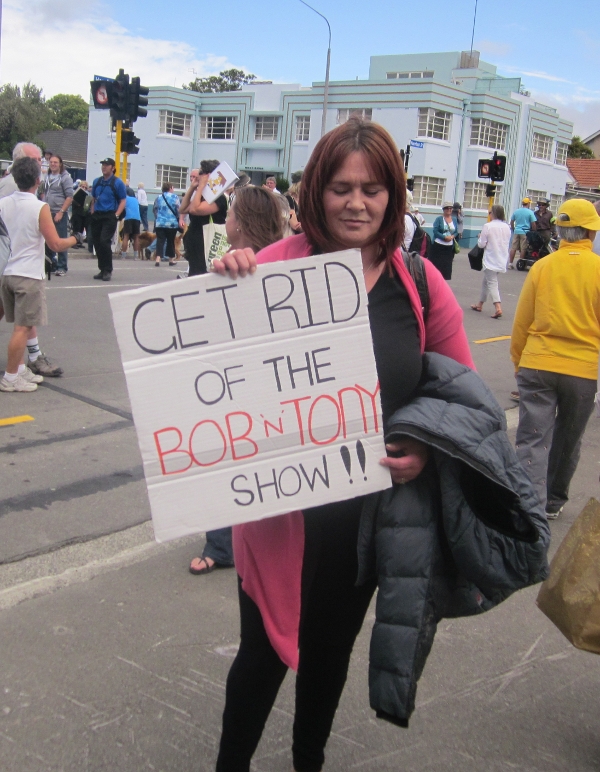 Approximately 2,000 people turned out to protest at the Christchurch City Council offices today, angry at a $68,000 pay rise for City Council CEO Tony Marryatt, taking his annual salary to over half a million (Christchurch average wage, $47,000pa). After enormous pressure from the public Marryatt has turned down the pay rise, after initially accepting it, but the protest incorporated a number of issues relating to democracy and transparency in local government.
Approximately 2,000 people turned out to protest at the Christchurch City Council offices today, angry at a $68,000 pay rise for City Council CEO Tony Marryatt, taking his annual salary to over half a million (Christchurch average wage, $47,000pa). After enormous pressure from the public Marryatt has turned down the pay rise, after initially accepting it, but the protest incorporated a number of issues relating to democracy and transparency in local government.
The Dialectical Relationship between Work and Mental Health (Part 1)
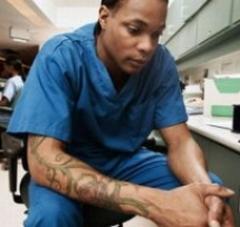 This article is the first in a series by Polly Peek addressing the issues of work and mental health from a Marxist perspective. For more information on the concept of dialectics see http://www.marxists.org/glossary/terms/d/i.htm. In this article the term ‘mental health community’ refers to those people experiencing mental illness or distress, and ‘consumer’ refers to those using or having previously used psychiatric services.. The role work plays in the mental health of people experiencing mental illness is complex, with research on the topic appearing somewhat contradictory on the surface, the most prominent contradiction being whether work is overall beneficial or detrimental to well-being and recovery. Research suggests that employment, or engagement in meaningful contribution is a “critical component of the pathway to recovery” (Mental Health Commission, 2001, cited in Duncan and Peterson, 2007) and that the most significant employment challenge for people experiencing mental illness is overcoming structural barriers to attaining work. At the same time, other studies indicate that the correlation between work and wellness is not so clear-cut, and that the kinds of jobs most accessible to the mental health community are also those with the highest likelihood of decreasingwell-being and obstructing recovery. In approaching this conflict through a dialectical analysis, the question of interplay between work and mental health moves from one of ‘is work more beneficial or detrimental to recovery and wellbeing’ to one of ‘how can the contradictions of employment’s simultaneous facilitation and eroding of wellness be resolved’. Continue reading “The Dialectical Relationship between Work and Mental Health (Part 1)”
This article is the first in a series by Polly Peek addressing the issues of work and mental health from a Marxist perspective. For more information on the concept of dialectics see http://www.marxists.org/glossary/terms/d/i.htm. In this article the term ‘mental health community’ refers to those people experiencing mental illness or distress, and ‘consumer’ refers to those using or having previously used psychiatric services.. The role work plays in the mental health of people experiencing mental illness is complex, with research on the topic appearing somewhat contradictory on the surface, the most prominent contradiction being whether work is overall beneficial or detrimental to well-being and recovery. Research suggests that employment, or engagement in meaningful contribution is a “critical component of the pathway to recovery” (Mental Health Commission, 2001, cited in Duncan and Peterson, 2007) and that the most significant employment challenge for people experiencing mental illness is overcoming structural barriers to attaining work. At the same time, other studies indicate that the correlation between work and wellness is not so clear-cut, and that the kinds of jobs most accessible to the mental health community are also those with the highest likelihood of decreasingwell-being and obstructing recovery. In approaching this conflict through a dialectical analysis, the question of interplay between work and mental health moves from one of ‘is work more beneficial or detrimental to recovery and wellbeing’ to one of ‘how can the contradictions of employment’s simultaneous facilitation and eroding of wellness be resolved’. Continue reading “The Dialectical Relationship between Work and Mental Health (Part 1)”
1000 a year die from work
According to new statistics from the Department of Labour:
- Workplace injuries are killing about 100 people
- More than 700 people die prematurely from work-related illness or disease
- More than 200,000 people are seriously harmed (this corresponds to 12 injuries for every 100 workers)1
- There are more than 17,000 new cases of work-related disease, with between 2,500 – 5,500 classed as severe
- Construction, agriculture, forestry, manufacturing and fishing consistently have above average fatal and major injury rates – accounting for approximately 37% of all ACC claims.2
Of those 200,000 serious injuries
- The manufacturing sector has the highest number of work-related injuries
- The highest injury-incidence rates are in the mining industry, construction industry, and agriculture, forestry and fishing sector
- Sprains and strains are by far the most frequent injury (90,000 claims), followed by open wounds (37,000 claims)
- An estimated 50% of injuries result in impairment, and 6% in permanent impairment.3
Death or injury on the worksite has been a constant battle between workers and bosses. This has existed going back to the first developments of capitalism in New Zealand, where a group of Bay of Islands Maori in 1821 staged the first strike, demanding “for their labour in money as was the case in England, or else in gunpowder.” or Samuel Parnell, a carpenter who on arrival in New Zealand in 1840 refused to work longer than an eight hour day.4 Continue reading “1000 a year die from work”
2011 General Election Analysis
From the December-January issue of The Spark.For a longer piece on the Mana Party in the election, see this article.
The Key Factor: PR and The National Party
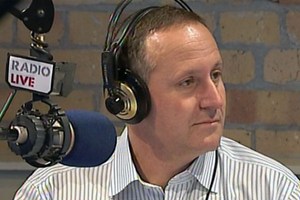 Novembers’ election saw a narrow victory for the National Party and its allies. Compared to their 2008 result, National saw their vote drop by about 10%- over 95,000 votes. They only received such a large share of the vote because Labours dropped even more- an enormous 255,000. ACT went from 5 MPs to 1, who would have been gone too if not for winning Epsom- the country’s richest electorate with the lowest Maori population. The Greens and NZ First were the only parties in parliament that grew their vote from 20081. 1 in 4 people did not vote. Continue reading “2011 General Election Analysis”
Novembers’ election saw a narrow victory for the National Party and its allies. Compared to their 2008 result, National saw their vote drop by about 10%- over 95,000 votes. They only received such a large share of the vote because Labours dropped even more- an enormous 255,000. ACT went from 5 MPs to 1, who would have been gone too if not for winning Epsom- the country’s richest electorate with the lowest Maori population. The Greens and NZ First were the only parties in parliament that grew their vote from 20081. 1 in 4 people did not vote. Continue reading “2011 General Election Analysis”
Firefighters and Port Workers Continue Struggle
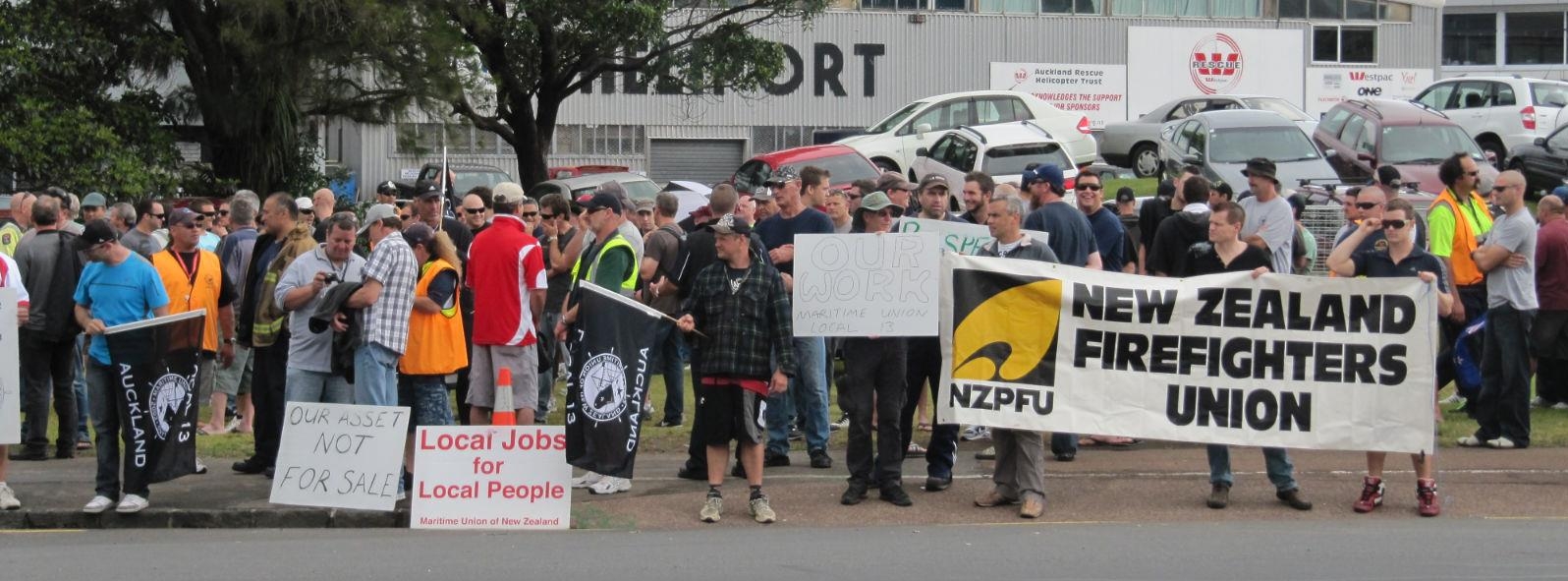
There are significant labour struggles going on with firefighters and port workers. Firefighters have been taking industrial action since August 5th. “They are still carrying out emergency response work, firefighter safety work and public safety work but not general duties.” Auckland union president Mike McEnaney told Stuff.co.nz. The professional fire service is strongly unionised- with 99% of New Zealands paid firefighters.
While no ones saftey is put at risk by the industrial action being taken, it has had an impact. The Herald reported a “media black out on emergency news” as reports from the control room are not being sent to media organisaions. Reports are also not being supplied to insurance companies and bills related to fires are not being sent out. Continue reading “Firefighters and Port Workers Continue Struggle”
Mana in the election
Mana held Tai Tokerau for Hone Harawira and achieved 1% of the party vote, a respectable outcome, considering that the movement was launched just seven months ago, with bugger all money, and that the Labour and Māori Parties colluded to try and strangle it at birth. Mana won 12.7% of the Māori votes, and gained more votes than the ACT Party. The campaign that we ran was a refreshing display of left wing unity between Tino Rangatiritanga activists, Workers Party, Socialist Aotearoa, Socialist Worker, ISO and others. Mana is on the map.
But Mana was unlikely to repeat the success of the Māori Party when it was launched in 2004. For a start, there was no hikoi this time, and of course, Mana did not have the backing of the Brown Table. Mana also failed to make a real breakthrough into the Pasefika and working class Pākehā communities, perhaps because it was perceived to be a party exclusively for tangata whenua, like the Māori Party.
Continue reading “Mana in the election”
Video: Marama Davidson on Occupy Auckland
Against conspiracy theories: Why our activism must be based in reality
The text of a talk given at Occupy Wellington, New Zealand, on October 27 2011. Around 55 people attended the talk, organised to try to counter the prevalence of conspiracy theories amongst the local wing of the Occupy movement.
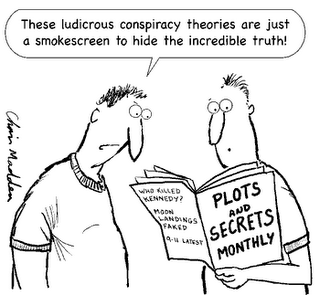
Kia ora kotou, thanks everyone for coming. Firstly, a brief run-down of how this workshop will work: first, I’m going to give a brief talk, followed by an open discussion which anyone can contribute to. I also want to make it clear that I’m not here today to debunk or debate any specific conspiracy theory. I’ve got no interest in doing that, I don’t think its particularly productive. What I want to be doing is talking about the title of the workshop is – why our activism must be based in reality. So we’ll be talking about the whole conspiracy world-view, we’ll be talking about what I think is a much better alternative to that, but I’m not going to sit here and argue with you over whether the Government is secretly poisoning us from the skies, or whether shape-shifting reptilian lizards are controlling our lives, or whether or not you can cure cancer with baking soda.
First up, who am I? For those of you who don’t know me my name is Asher, I’m born and bred in Wellington, though I have also spent a few years recently living in Christchurch. I’ve been involved in activism and radical politics for around about 7 years, in a variety of different campaigns and struggles.
If we’re going to talk about conspiracy theories, the first important question is obvious: what is a conspiracy theory?
Now, if you go by a dictionary definition, a conspiracy is just a group of people who get together to plan something, and don’t tell others about it. If I’m organising a surprise birthday party for my friend, then I am conspiring with others. But that’s not a particularly useful definition for the purposes of a discussion like this.
So, for this discussion, the way I’m defining a conspiracy theory is thus: a conspiracy theory is a theory based in supposition, one that flies in the face of evidence or science, often one that claims its correctness can be shown by the paucity of evidence in favour of it, in the sense that ‘this conspiracy goes so far that they’ve even buried all the evidence that proves it!’ Conspiracy theories often encourages an ‘us few enlightened folk versus everyone else’ world view. This creates an atmosphere where conspiracy theorists look down on people, or sheeple as they are often called, and ignores the fact that people, by and large, are actually pretty intelligent. In and of itself this world-view is hugely problematic for as I will discuss later, mass social change requires the participation of the masses and therefore, we have to have faith in the ability of people to decide things for themselves, to come to correct conclusions and ultimately to change the world. Continue reading “Against conspiracy theories: Why our activism must be based in reality”
Christchurch Labour Day March
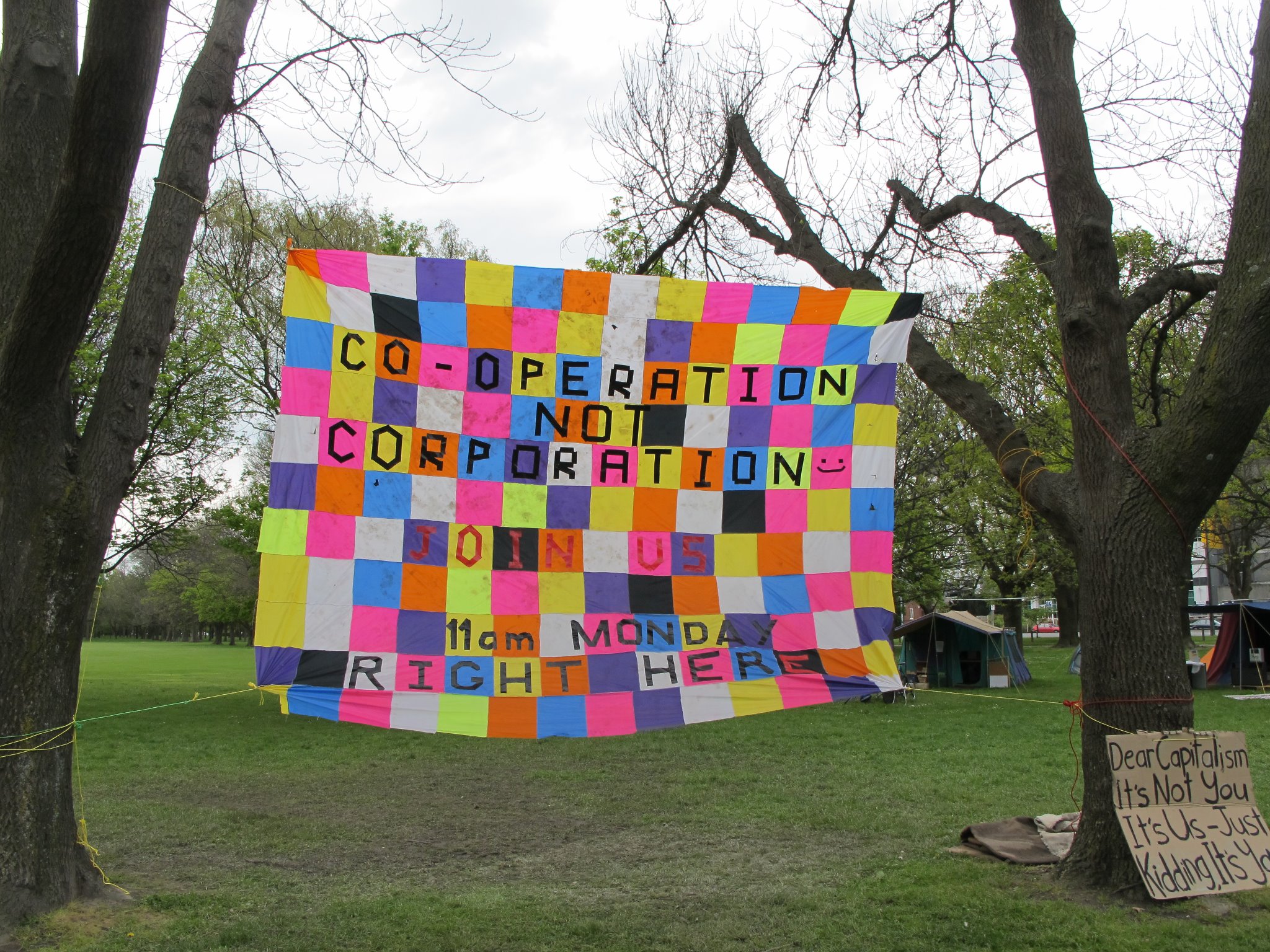 The Occupy movement in Christchurch has organised a march for Labour day. The occupation has being going since October 15th, an an initial march attracted 300 people. A statement on the group’s website reads “This Monday is Labour Day. A day to celebrate the workers in Aotearoa, to remember the difficult year we have experienced, and to celebrate everything that the Occupy Movement has achieved on a local, national and international scale.”
The Occupy movement in Christchurch has organised a march for Labour day. The occupation has being going since October 15th, an an initial march attracted 300 people. A statement on the group’s website reads “This Monday is Labour Day. A day to celebrate the workers in Aotearoa, to remember the difficult year we have experienced, and to celebrate everything that the Occupy Movement has achieved on a local, national and international scale.”
MEET AT: Occupy Christchurch – South Hagley Park (next to bus exchange & hospital)
TIMETABLE:
11am – Greetings and live music
12pm – march around the cordon
– There will be short speeches the Art Centre (builders from the CBD, Red Zone residents, University Lecturers, Students, Young Workers )
2.00 – 2.30pm – return to Occupy camp for refreshments (please bring what non-alcoholic refreshments you can), live music, performances
and a celebration of what we have achieved and look to our future.
Organisers have requested that the march not be used to promote any political party and stress that the event is drug and alcohol free.
Occupy New Zealand
On October 15th New Zealand cities joined the global “Occupy” movement which as of this writing is taking place in 1500 cities in over 100 countries as a protest against wealth inequality. The December issue of The Spark will include further coverage of the movement; here we publish the statements issued by the occupations taking place in Auckland, Wellington, Christchurch and Dunedin.
Auckland
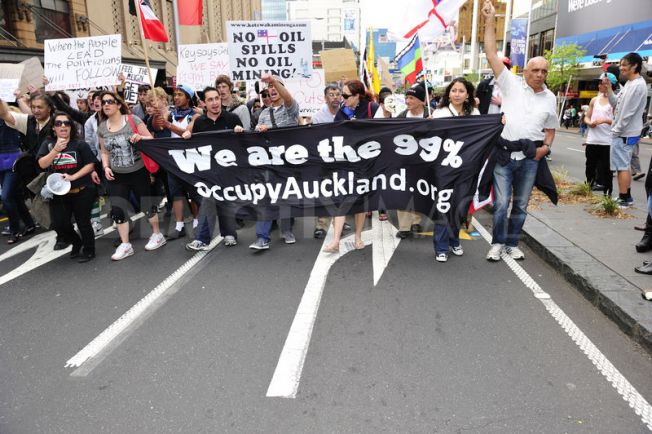 [Occupy] Auckland is a leaderless resistance movement with people of many colours, genders and political persuasions. We are the 99% and we believe in people and the planet before profit. We will no longer tolerate the greed and corruption of the 1%.
[Occupy] Auckland is a leaderless resistance movement with people of many colours, genders and political persuasions. We are the 99% and we believe in people and the planet before profit. We will no longer tolerate the greed and corruption of the 1%.
We are also in solidarity with http://www.OccupyWallStreet.org , http://www.OccupyTogether.org and all of the Occupy movements around Aotearoa New Zealand and the world.
We will be occupying Aotea Square from the 15th of October and encourage the use of nonviolence to maximise the safety of all participants.
We recognise Aotea Square as Ngati Whatua land and that it is also a public space. Ngati Whatua have kindly consented to us ‘occupying’ this land. Continue reading “Occupy New Zealand”

